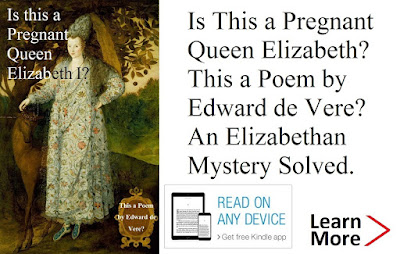Rawdon Brown was the editor of the fascinating Calendar of State Papers and Manuscripts relating to English Affairs existing in the Archives of Venice and Northern Italy. Perhaps he was chosen to assemble the calendar because of his informative and expressive translation of the dispatches of the Venetian Ambassador to England, Sebastiano Giustiniani. The dispatches are an historical treasure.
Here we have his description of the lavish reception he was
given upon receiving permission to present his credentials to the King. Venice
was still far and away the great trading power in the West and a vital ally. Its
ambassador was treated accordingly. We are provided, then, a remarkable look at
a grand reception in the audience chamber of Richmond Palace.
The dispatch is written, toward the end, in the hand of Giustiniani’s
traveling companion Piero Pasqualigo, of a separate audience with Queen Catherine
of Aragon in which the conversation took place in the Spanish language. As a
final touch, the appeal, in his own hand, of Andrea Badoer, whom Giustiani was replacing, for
funds in order to return to Venice is included as it was another common feature
of diplomatic life even at the highest levels.
London, 26th April 1515.
By our letters of the 21st of April, your Highness will have
been informed of many occurrences, and especially that on St. George's Day we were
to have public audience of his Majesty. By these present we acquaint you that,
on that appointed day, his Majesty aforesaid sent a prelate and a knight, and
an honourable train, to escort us from our dwelling; and they conducted us by
the Thames to a palace of his, called Richmond, ten miles hence, where we found
the whole court, and well nigh all the lords and prelates of the kingdom,
assembled. We were ushered into a stately hall, where all the aforesaid were conger
gated: at one extremity was his Majesty standing near a gilt chair," surmounted
by many regal insignia, and his Majesty was under a canopy, with a gold ground
and a raised pile, arrayed in the robes of the garter, as were eight other
Knights of the Order. Having been introduced to his Majesty, and after kissing
his hand, and presenting to him your Serenity's letters of credence, I,
Sebastian, delivered a Latin oration, in which we congratulated ourselves, in
the first place, on his Majesty's good health; secondly, we condoled with him
on the death of the late King Louis, his brother-in-law; thirdly, we thanked
his Majesty for that, in the league formed with the aforesaid Christian King,
he had named your Sublimity as his friend and ally, and on this point we dwelt
at length, and in the warmest terms; fourthly, we expressed our joy at the new
confederation made by his Majesty with the most Christian King Francis;
finally, we launched out in praise of his Majesty, whom we extolled with all
the eloquence we could command, drawing such conclusions as suited our purpose,
which oration was most attentively listened to by his Majesty and by all the
prelates and lords there present.
London, 3rd May 1515.
By the accompanying letters your Sublimity will have learned
what took place down to their date. We now inform you that we have been every day
visiting these lords, both lay and ecclesiastical, declaring to them the regard
and esteem wherein your Serenity holds their persons, thanking them for what
they had done in favour of your Excellency's affairs, suiting our language to
their condition, and more or less lovingly, according to their deserts,
disposing them to persevere in their good offices for the welfare and quiet of
your Excellency’s dominions, as it cannot but prove to the advantage and honour
of this most serene kingdom, to favour those who are basely oppressed, notwithstanding
the good faith and good will they bear his Majesty.
…this most serene King is not only very expert in arms, and
of great valour, and most excellent in his personal endowments, but is likewise
so gifted and adorned with mental accomplishments of every sort that we believe
him to have few equals in the world. He speaks English, French, and Latin;
understands Italian well; plays almost on every instrument; sings and composes
fairly (delegnamente); is prudent and sage, and free from every vice; and, besides
is so good and affectionate a friend to the most serene State, that we consider
it certain no ultramontane sovereign ever surpassed him in this respect. On
account of your Highness, he paid us such great honours, both in public and
private, that were we to attempt narrating them in detail, we should not know
how to do it in becoming terms;…
*
*
*
We visited the most serene Queen, and, knowing that it would
please her, I, Piero, addressed myself to her in Spanish, presenting your Serenity's
credentials, ever keeping to general topics, and offering our services. Her
Majesty answered me in Spanish also, with her own lips, and then entered into a
familiar conversation on the affairs of Spain, when I took respectful leave of
her likewise; and being thus dismissed by both their Majesties, and having
executed our commission to a hair, I, Piero, to-morrow morning, if it please
God, shall infallibly depart hence on my way back with all speed to the French
court; and I, Sebastian, will remain here to do what from time to time I may
deem becomes the honour and benefit of the State. I, Andrea, indeed, being unable
to do otherwise, shall await a supply of money from your Highness, in order to
extricate me from my embarrassments; and on receiving such, will depart
forthwith on my return to your feet.
Source: Brown, Rawdon. Four Years at the Court of Henry VIII. Selection of His Despatches ..., Volume 1 (1854). 72-6.
Also at Virtual Grub Street:





No comments:
Post a Comment